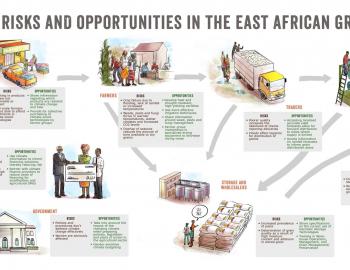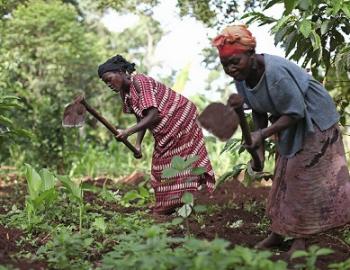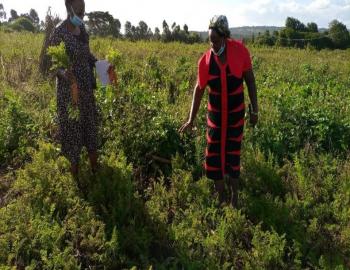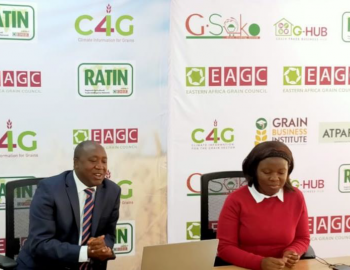Mitigating the effects of climate change on grain quality and post-harvest losses in East Africa
Mitigating the effects of climate change on grain quality and post-harvest losses in East Africa
The Eastern Africa Grain Council, in partnership with CDKN, launched this project in Kenya and Uganda in 2019. The project focuses on promoting climate change adaptation initiatives that are designed to positively impact agricultural productivity in the grain sector, and therefore improve food security for the region.
Context
According to a report by Africa Post-Harvest Loss Information System, climate change is expected to have a significant impact on agricultural productivity through climatic and weather conditions (droughts, variable precipitation and extreme weather events), and by creating conditions favourable for crop diseases and pests. As a result of these impacts, large proportions of grain can become unusable after it has been harvested. These post-harvest losses have consequences throughout the grain supply chains, increasing market prices, reducing livelihood opportunities and can have consequences for human health.
Project objective
The project’s overall vision is to create a climate resilient community of grain stakeholders that use climate information to increase grain production, reduce post-harvest losses and improve market access for food security and improved livelihoods.
Project activities and outputs
The project will share information that is designed to help stakeholders within the grain value chain make climate-smart decisions. This information will be in the form of recommendations based on seasonal forecasts, early-warnings of pest infestations or extreme weather events and recommendations or climate-smart technologies.
The project is currently assessing the climate information needs for the various stakeholders in the grain value chain. This assessment will ensure that both the content and the method for communicating climate-smart information will be tailored depending on who is the recipient. The project will use a host of different communication channels such as publications, media engagement (radio) and an interactive digital communication platform. The project will also look to provide in-person training on climate-resilient technologies and practises through their grain-hubs (farmer groups). In addition, creating female climate champions is an integral part of the project’s mandate. By engaging women-led business in the grain sector, and encouraging them to document testimonials of their experiences with respect to climate change, the project aims to create female climate champions in the sector.
Outputs from the project include:
- Report on climate information needs of the grain stakeholders.
- Infographic on climate risks and opportunities in the grain value chain.
- Climate information communicated to grain stakeholders through media and outreach events, and a report on 10 best practices in climate change mitigation and adaptation in the grain value chain in English and Swahili.
- Showcase the role of knowledge sharing in addressing climate change affects with government and the grain stakeholders at the African Grain Trade summit.
- Develop a Policy Brief on how climate change affects post-harvest losses in the grain sector in Uganda and Kenya, and share with government officials.
- Farmers trained on the interpretation and applications of climate information, through a training manual in English and Swahili.
- Women acting as climate change champions and sharing their experiences implementing climate-smart practices.
- Farmers are aware of, and understand, the different technologies that can help mitigate some of their climate-related risks.
Partners: Climate Prediction and Application Centers (ICPAC), National Disaster Management Authority (NDMA), Select Fresh Produce Ltd.
Photo: A farmer in Kenya uses compost pit manure on her farm. Courtesy of Greenpeace Africa.




